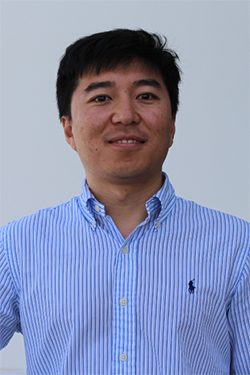Jiannan Zhaid

Providing Value to Researchers
By Lynn Laurenti
Images of garbage-strewn beaches and overflowing landfills are commonplace today, raising urgent concern about what can be done to stem the flow of this wasteful pollution. About 40 percent of food cultivated in the U.S. goes to waste at a cost of $165 billion annually, even as one in six Americans go hungry. Reducing the amount of waste by just 15 percent would generate enough food to feed about 25 million people, cutting the food shortage problem almost in half, agrees Jiannan Zhai, Ph.D., chief engineer and research assistant professor at FAU’s Institute for Sensing and Embedded Network Systems Engineering (I-SENSE).
How might this situation be addressed? Enter the Internet of Things, an ingenious advance in sensing technology with the ability to generate data on an enormous array of phenomena, from tracking regional weather patterns to monitoring the health of individuals. I-SENSE, under the leadership of Jason Hallstrom, Ph.D., is at the forefront of this revolution in smart systems.
Zhai is part of a research team that is focused on reducing the amount of waste produced by school cafeterias. He helped design and test an automated method of measuring food waste at FAU’s main cafeteria and the dining facility at the A.D. Henderson University School, including real-time feed-back. Called WASTE REDUCE (Waste Auditing Sensor Technology to Enhance the Reduction of Edible Discards in University Cafeterias and Eateries), the system prototype employed weight-detecting sensors placed inside trash cans at both dining venues, along with screens displaying messages to students drawing their attention to the problem of excess meal waste and illustrating each day’s discards through graphics that included accumulating plastic bags of garbage and uneaten slices of pizza. The full study, published in Advances in Science, Technology and Engineering Systems Journal, can be accessed here.
“Effecting meaningful behavioral change in individuals and groups is a time-proven means of promoting better behavior,” Zhai said. “Individuals and organizations must find proper incentives to stimulate the desired change, relying on multiple sources of information and appealing to varied self or group interests. This research focused on effecting behavioral change using targeted feedback derived from in-situ measurement data. The sense-compute-feedback architecture used in the study was proven to achieve behavioral change in instrumental environments. The greatest benefits gained from ubiquitous sensing will derive from the behavioral changes the associated datasets can elicit in individuals and groups. We believe that lasting behavioral changes would have profound impacts, directly contributing to improving our environmental and financial future.”
Zhai, who holds a Ph.D. in computer science from Clemson University, joined FAU’s I-SENSE team in 2015. Here is more information about him, in his own words:
The people. I-SENSE has been very supportive of my research and I work with a great a team of engineers and students.
I-SENSE provides us an environment where we can explore new technologies and try new ideas together. I learn new things every day, so although I don’t teach in the classroom, my workplace is my classroom.
The engineering team at I-SENSE has five full-time engineers and a number of student interns – most of them are younger than me. I share my knowledge with my colleagues and students and I learn more from them.
Work hard, be patient, be kind.